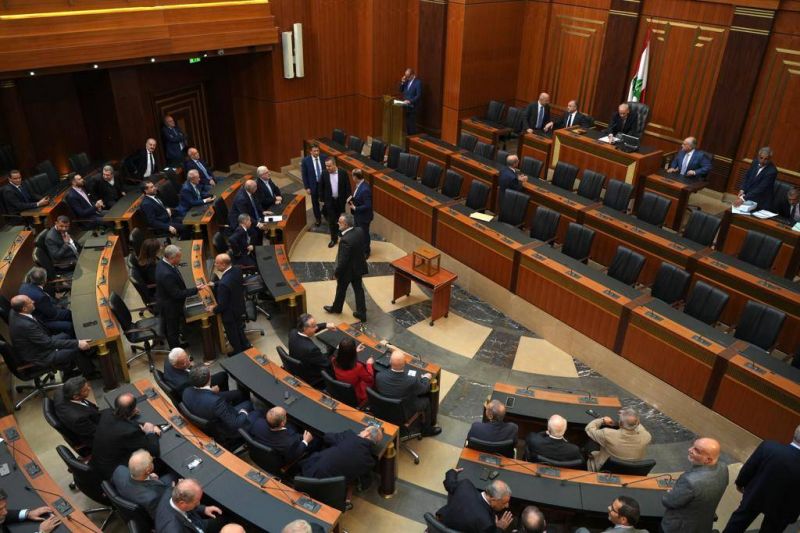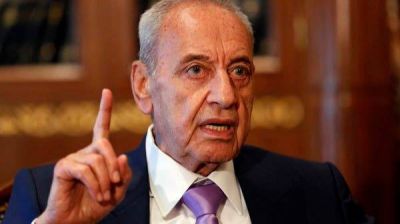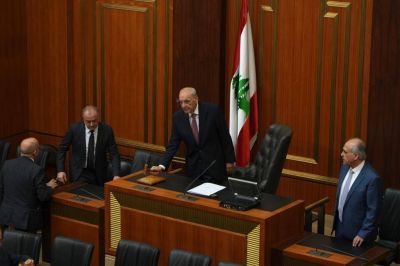
Lebanese MPs during the fifth presidential election session, on Nov. 10, 2022. (Credit: Mohammad Yassin)
Lebanese MPs failed Thursday, at the end of a fifth dedicated parliamentary session, to elect a successor to Michel Aoun, whose term as president expired on Oct. 31.
This new failure came after several parliamentarians, including those from the Free Patriotic Movement and Hezbollah, withdrew from the session after a first round of voting, causing a loss of quorum, just like in previous electoral sessions.
This new failure comes at a time when Lebanon finds itself facing, since Nov. 1, a total power vacuum at the executive level: the country is without a president and its cabinet has, since its resignation following May parliamentary elections, been serving only in a caretaker capacity. There is disagreement over whether the caretaker cabinet may assume certain presidential authorities during the vacancy period. The constitution states that the cabinet may do so, but does not specify whether a caretaker cabinet is granted such power.
According to Berri, the required two-thirds quorum of 86 out of 128 MPs was attained to allow a first round of voting on Thursday.
After the session began at 11 a.m., 108 MPs participated in the first round of voting. Forty-four MPs voted for Zgharta MP Michel Moawad, who had received 39 votes in the fourth electoral session; 47 voted blank; six voted for professor and respected scholar Issam Khalifeh, one voted for ex-minister Ziad Baroud, one for Ziad Hayek, former secretary general for the privatization and partnerships council, seven voted for "The new Lebanon," one voted "For Lebanon," and one ballot containing "Plan B" was canceled.
After the loss of quorum, Deputy House Speaker Elias Bou Saab, quoting Parliament Speaker Nabih Berri, announced a new electoral session for Nov. 17.
Quorum of two-thirds
MP Sami Gemayel (Kataeb Party/Metn) said following the session that Articles 49 and 74 of the Lebanese Constitution "do not specify that the quorum should be at two-thirds following the first round of voting." He added that MPs have the duty to respect and apply the law and remain inside the Parliament to elect a new president. Gemayel had also voiced his objection during today's session, confronting Berri about the constitutionality of his decision to resume the rules of a first-round vote at each presidential electoral session following the initial one.
Forces of Change MP Melhem Khalaf said he called on Berri to "keep the session open until a new president is elected," highlighting that a quorum of 86 MPs is required in the first round of voting and a simple majority of 65 MPs in the second round to elect a president.
Forces of Change MP Ibrahim Mneimneh stated that there has been "obstruction which requires an initiative to be reached," adding that the process also "needs a signal, specifically from outside, for things to move forward" — an apparent reference to the need for foreign intervention to progress the presidential election.
Forces of Change MPs have split between voting for Michel Moawad and Issam Khalifeh.
Speaking after the session, Issam Khalifeh said he had agreed to run for president after MPs from the Forces of Change bloc nominated him. Khalifeh assured that if elected he would work "to defend the rights of the Lebanese, the independence and sovereignty of the country and to strengthen its security."
'Serious candidate'
Lebanese Forces MP Georges Adwan expressed a sense of hope after Moawad received 44 votes at Thursday's session, saying the candidate could have had five additional votes from MPs who were absent due to personal reasons. Adwan stressed that Moawad has the full support of the LF parliamentary bloc, assuring that next Thursday he will receive more votes "because some MPs assured us that they will vote for him following some calls we made with them." Adwan added that Moawad is "a serious candidate."
Adwan revealed that Moawad has been receiving votes from Forces of Change MPs and some Sunni MPs.
Zgharta MP and presidential candidate Michel Moawad estimated that "from one session to another, it is clear that the number of people who vote for me increases while all other proposals fall." He noted that now "nearly 50" MPs support him. Following Thursday's session, Moawad also assured that he will try to "regroup the dispersed opposition."
Free Patriotic Movement MP Alain Aoun said that "as long as some parties do not change their candidate," the parliamentary sessions will not allow the election of a president. "Our choice to vote blank aims to pave the way for dialogue and reach a candidate" around whom there is agreement, he added. The MP's camp and its ally Hezbollah, as well as the Amal Movement, have cast blank ballots since the first electoral session.
Lebanon entered the presidential election period on Sept. 1, but Berri waited until Sept. 29 to call the first electoral session. Faced with a camp united behind Hezbollah and still voting blank to due a lack of agreement on a single candidate, opposition groups remain drowned in their differences, accentuated by the schism within the Forces of Change bloc.
At each new Parliament session convened to elect a new president, the voting process is reset, meaning that even if a first round vote took place at the previous session, the legislature will again begin with a first round vote. There is some debate that this approach in fact contradicts the constitution, according to which, a two-thirds majority is needed for the first round of voting, while only a simple majority is required in all subsequent rounds. Some contend that first found should be considered as the vote Parliament held on Sept. 29, which returned no conclusive results. To date, Parliament has not reached a second round of voting on candidates due to the loss of quorum at each of the sessions convened, with members of the camp loyal to Aoun and his allies withdrawing from the session after the first round of voting.
The international community has repeatedly called on Lebanon to put an end to the total vacuum at the executive level, pleading for the election of a new president without delays. Lebanon, grappling with a dire economic crisis since 2019, needs to implement serious reforms in order to obtain international financial assistance.

